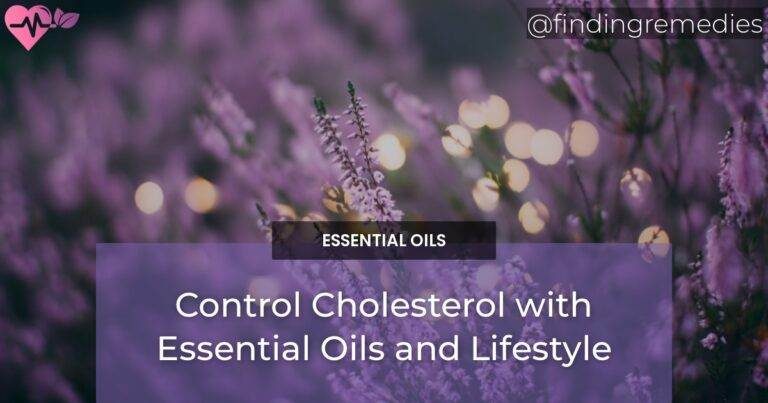High cholesterol is a common health condition that affects millions of people worldwide. It occurs when there is an excessive amount of cholesterol in the blood, leading to various cardiovascular problems. While medication is often prescribed to control cholesterol levels, there are natural remedies that can be equally effective. In this article, we will explore how essential oils and lifestyle changes can help control cholesterol levels and improve heart health. We will discuss the causes and symptoms of high cholesterol, essential oils that are beneficial for heart health, diet and exercise recommendations, medication options, and conclude with the importance of managing cholesterol levels for a healthy life.
Causes and Symptoms of High Cholesterol
Causes of High Cholesterol
High cholesterol can be caused by a combination of factors, including genetics, unhealthy diet, sedentary lifestyle, smoking, and certain medical conditions. Genetic factors may make individuals more prone to high cholesterol levels, while an unhealthy diet high in saturated and trans fats can contribute to the problem. Lack of physical activity and smoking can also negatively impact cholesterol levels. Additionally, certain medical conditions such as diabetes, obesity, and hypothyroidism can increase the risk of high cholesterol.
Symptoms of High Cholesterol
High cholesterol does not typically present any noticeable symptoms. It is often referred to as a silent condition because individuals may not be aware of their elevated cholesterol levels until they experience a related health issue. Therefore, it is important to regularly monitor cholesterol levels through blood tests. In some cases, high cholesterol may lead to the formation of cholesterol deposits in the skin or a condition called xanthomas, which appear as small, yellowish bumps.
Essential Oils to Improve Heart Health
ALSO READ
Lavender Oil
Lavender oil is not only known for its pleasant scent but also for its potential benefits in improving heart health. It has been found to help reduce inflammation, lower blood pressure, and promote relaxation, which can contribute to better heart health. The calming properties of lavender oil may also help reduce stress and anxiety, which are risk factors for high cholesterol.
Peppermint Oil
Peppermint oil is commonly used for its refreshing aroma and digestive benefits, but it also offers potential advantages for heart health. It may help relax arterial walls, promoting better blood flow and reducing blood pressure. Additionally, peppermint oil has antioxidant properties that can protect against oxidative stress, which is known to contribute to cardiovascular issues.
ALSO READ
Lemon Oil
Lemon oil is a versatile essential oil that has numerous health benefits, including its positive effects on heart health. It is rich in antioxidants and has been shown to help reduce cholesterol levels and prevent the oxidation of LDL (bad) cholesterol. Lemon oil may also support healthy blood pressure levels and improve overall cardiovascular function.
Rosemary Oil
Rosemary oil is not just a flavorful herb; it also possesses potential cardiovascular benefits. Studies have suggested that rosemary oil may help lower cholesterol levels and reduce inflammation in the body. It has also been shown to have antioxidant properties that can protect against free radicals and oxidative stress, both of which are associated with heart disease.
Diet and Exercise Recommendations
Heart-Healthy Diet
Adopting a heart-healthy diet plays a crucial role in managing cholesterol levels. Incorporating certain foods into your daily meals can help lower LDL cholesterol and increase HDL (good) cholesterol. Some cholesterol-lowering foods include:
- Orange
- Cinnamon
- Garlic
- Rosemary
- Celery seed
- Ginger
Incorporating these foods into your diet can have a positive impact on cholesterol levels and overall heart health.
Regular Physical Activity
Engaging in regular physical activity is crucial for managing cholesterol levels. Exercise helps increase HDL cholesterol, improve blood flow, and promote weight loss, all of which contribute to better heart health. Aim for at least 30 minutes of moderate-intensity exercise most days of the week. Activities such as brisk walking, swimming, cycling, and dancing are excellent choices for improving cardiovascular fitness.
Medication for High Cholesterol
When Medication is Needed
In some cases, lifestyle changes and natural remedies may not be sufficient to control cholesterol levels. If cholesterol levels remain high despite these interventions, medication may be necessary. It is important to consult with a healthcare professional who can assess your individual situation and determine the appropriate course of treatment.
Types of Medications
There are several types of medications commonly used to manage high cholesterol. These include statins, bile acid sequestrants, cholesterol absorption inhibitors, and PCSK9 inhibitors. Each medication works differently to lower cholesterol levels and may have specific considerations and potential side effects that should be discussed with a healthcare provider.
Can Essential Oils Used for Hair Growth also Help in Controlling Cholesterol?
Yes, certain essential oils for hair growth such as rosemary and cedarwood have been shown to have cholesterol-lowering effects when used in aromatherapy. These oils can also promote hair growth by improving circulation and reducing inflammation on the scalp.
Conclusion
Controlling cholesterol levels is crucial for maintaining good heart health and reducing the risk of cardiovascular diseases. Along with medication options, incorporating essential oils such as lavender, peppermint, lemon, and rosemary into your routine can provide additional support. Additionally, adopting a heart-healthy diet and engaging in regular exercise are essential for managing cholesterol levels. By making these lifestyle changes and seeking appropriate medical guidance, you can take control of your cholesterol levels and improve your overall cardiovascular well-being.

